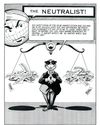試す 金 - 無料
THE AUTHORITARIAN CONVERGENCE
Reason magazine
|October 2022
THE PROBLEM WITH AMERICAN POLITICS ISN'T POLARIZATIONIT'S RISING ILLIBERALISM.

SOMETHING IS BROKEN in our politics. Just about everyone knows it, but it can be hard to put your finger on what it is.
As the media attempt to grapple with this felt reality, they reach over and over for the same word: polarization. That, we’re told, is the shorthand for what has gone wrong. Where once the country had its share of conservative Democrats, liberal Republicans, and mushy moderates, today the two parties are more internally consolidated—and further apart from each other—than ever.
But what if that explanation is missing something? What if there’s a sense in which left and right are actually converging, and the nature of that convergence is the real source of the perception that something isn’t right?
In 2014, Pew Research Center released a report on the crisis of polarization. “The overall share of Americans who express consistently conservative or consistently liberal opinions has doubled over the past two decades,” it explained. “Today, 92% of Republicans are to the right of the median Democrat, and 94% of Democrats are to the left of the median Republican.”
According to the report, as the center of gravity within each party shifted out toward the extremes (ideological polarization), dislike and distrust of those on the other side of the aisle increased as well (affective polarization). We disagree on more than ever and like each other less than ever. There you have it: the recipe for toxic politics.
Yet by 2021, Pew had settled on a different framework for understanding the American political landscape. In a major report released last fall, the think tank introduced a political typology that focuses attention on the divisions within the left and right.
このストーリーは、Reason magazine の October 2022 版からのものです。
Magzter GOLD を購読すると、厳選された何千ものプレミアム記事や、10,000 以上の雑誌や新聞にアクセスできます。
すでに購読者ですか? サインイン
Reason magazine からのその他のストーリー

Reason magazine
A Nostalgic Read for Foreign Policy Elites
IF YOU WERE looking for a human avatar of America's unipolar moment, you couldn't do better than Michael McFaul. Picture a youthful, energetic McFaul with a newly minted Ph.D. bounding into the suddenly post-Soviet space of the early 1990s, full of bright ideas about democracy and faith in the end of history. As McFaul himself puts it, 1991 \"was a glorious moment to be a democratic, liberal, capitalist, multilateralist, and American....I was treated like a rockstar.\"
4 mins
January 2026

Reason magazine
TRUMP IS DEPORTING ENTREPRENEURS
THE TRUMP ADMINISTRATION'S MASS DEPORTATION EFFORT IS ROBBING THE U.S. OF IMMIGRANT BUSINESS OWNERS AND THEIR CONTRIBUTIONS.
9 mins
January 2026
Reason magazine
The First Information Revolution
PRINTING PRESSES AND LIBRARIANS INTERPRETED CENSORSHIP AS DAMAGE AND ROUTED AROUND IT.
11 mins
January 2026

Reason magazine
What Would Bill Buckley Do?
THE NATIONAL REVIEW FOUNDER'S FLEXIBLE APPROACH TO POLITICS DEFINED CONSERVATISM AS WE KNOW IT.
7 mins
January 2026

Reason magazine
MAHA Mandates Food Labels
BURDENSOME FOOD LABELING mandates were once the province of Democrats, who pushed for calorie count requirements on restaurant menus and insisted packaged food must feature warnings about genet- ically modified ingredients and trans fats. Now it's Republicans leading the charge- with equally foolish results.
2 mins
January 2026

Reason magazine
IS JAKE TAPPER DOOMED?
THE CNN ANCHOR ON THE WAR ON TERROR, THREATS TO FREE SPEECH, AND THE FUTURE OF MEDIA
14 mins
January 2026

Reason magazine
REPUBLICAN SOCIALISM
THE TRUMP ADMINISTRATION IS BUYING STAKES IN COMPANIES. THAT NEVER ENDS WELL.
13 mins
January 2026

Reason magazine
A Taste of Capitalism in Warsaw
WARSAW, POLAND, IS a living museum of economic systems. It's a city where concrete reliefs of stoic factory workers decorate a building that now houses a Kentucky Fried Chicken, where a Soviet-era apartment block stands beside a glass tower filled with coworking spaces.
2 mins
January 2026

Reason magazine
Robert Crumb's Roving Art and Life
IN THE SPRING of 1962, an 18-year-old Robert Crumb was beaned in the forehead by a solid glass ashtray. His mother, Bea, had hurled it at his father, Chuck, who ducked. Robert was bloodied and dazed, once again a silent and enraged witness to his family's chaos.”
5 mins
January 2026

Reason magazine
THE HOWARD ROARK OF COMICS
SPIDER-MAN CO-CREATOR STEVE DITKO WAS A GREAT EXAMPLE OF, AND DIRE WARNING TO, OBJECTIVIST POP ARTISTS.
12 mins
January 2026
Translate
Change font size

